In #6901 some special case handling for proc-macros was introduced to
prevent panicing as they have no AST. Now the new HasSource::source
method is used that returns an option.
Generally this was a pretty trivial change, the only thing of much
interest is that `hir::MacroDef` now implements `TryToNav` not `ToNav`
as this allows us to handle `HasSource::source` now returning an option.
6964: Add full pattern completions for Struct and Variant patterns r=matklad a=Veykril
Just gonna call it full pattern completion as pattern completion is already implemented in a sense by showing idents in pattern position. What this does is basically complete struct and variant patterns where applicable(function params, let statements and refutable pattern locations).
This does not replace just completing the corresponding idents of the structs and variants, instead two completions are shown for these, a completion for the ident itself and a completion for the pattern(if the pattern make sense to be used that is). I figured in some cases one would rather type out the pattern manually if it has a lot of fields but you only care about one since this completion would cause one more work in the end since you would have to delete all the extra matched fields again.
These completions are tagged as `CompletionKind::Snippet`, not sure if that is the right one here.
<details>
<summary>some gifs</summary>
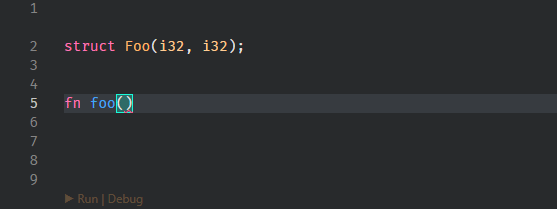
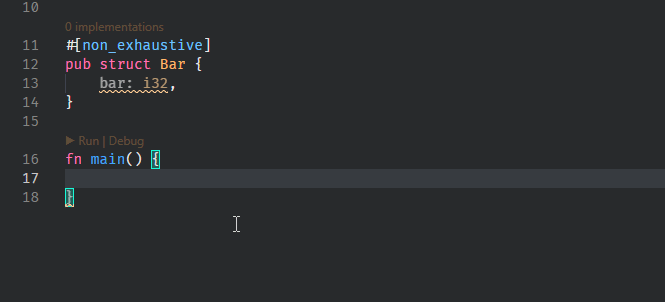
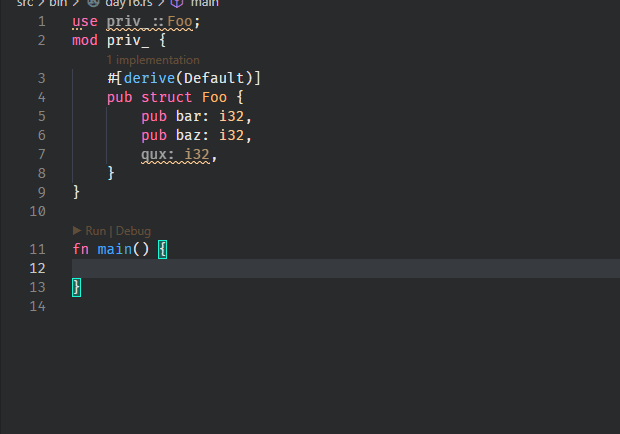
</details>
Co-authored-by: Lukas Wirth <lukastw97@gmail.com>
6921: Higher-ranked trait bounds for where clauses r=flodiebold a=Veykril
There is a slight problem with this which is also noted in a FIXME now but `LifetimeParameters` of these ForLifetime where clauses allocate the lifetimes in the corresponding arena as if they were lifetimes of the item itself and not just the clause they belong to. I wasn't entirely sure what I could do about this but given nothing really uses lifetimes like that currently I figured it might be fine? Open to suggestions for that problem.
Co-authored-by: Lukas Wirth <lukastw97@gmail.com>
6901: Temp fixes panic caused by no ast for proc-macro r=maklad a=edwin0cheng
There are some panic when hover/goto definition for proc-macro. It is because in current design, we don't have `ast-node` for proc-macro and then it trigger [this](479d1f7eec/crates/hir/src/has_source.rs (L116)) line to panic.
This PR is a temp fix for all of these similar to bd4c352831/crates/completion/src/render/macro_.rs (L42)
Co-authored-by: Edwin Cheng <edwin0cheng@gmail.com>
We used to have `Def` suffix for all symbols, but we moved off from
that. `FunctionDef` isn't better than `Function`. Looks like we've
forgot to change `Impl` though!
6896: Node-ify lifetimes r=jonas-schievink a=Veykril
Let's see if this passes the tests 🤞
Depends on https://github.com/rust-analyzer/ungrammar/pull/15
Co-authored-by: Jonas Schievink <jonasschievink@gmail.com>
Co-authored-by: Jonas Schievink <jonas.schievink@ferrous-systems.com>
Co-authored-by: Lukas Wirth <lukastw97@gmail.com>
6897: Basic support for macros 2.0 r=jonas-schievink a=jonas-schievink
This adds support for (built-in-only) macros 2.0, and removes some hacks used for builtin derives, which are declared via macros 2.0 in libcore.
First steps for https://github.com/rust-analyzer/rust-analyzer/issues/2248.
Blocked on https://github.com/rust-analyzer/ungrammar/pull/16.
Co-authored-by: Jonas Schievink <jonasschievink@gmail.com>
Co-authored-by: Jonas Schievink <jonas.schievink@ferrous-systems.com>
6818: Add Lifetimes to the HIR r=matklad a=Veykril
This doesn't handle resolve yet as I don't know yet how that will be used. I'll get to that once I start moving the lifetime reference PR to the hir.
This also adds a new `hir` name type for lifetimes and labels, `hir::LifetimeName`.
Co-authored-by: Lukas Wirth <lukastw97@gmail.com>
6553: Auto imports in completion r=matklad a=SomeoneToIgnore
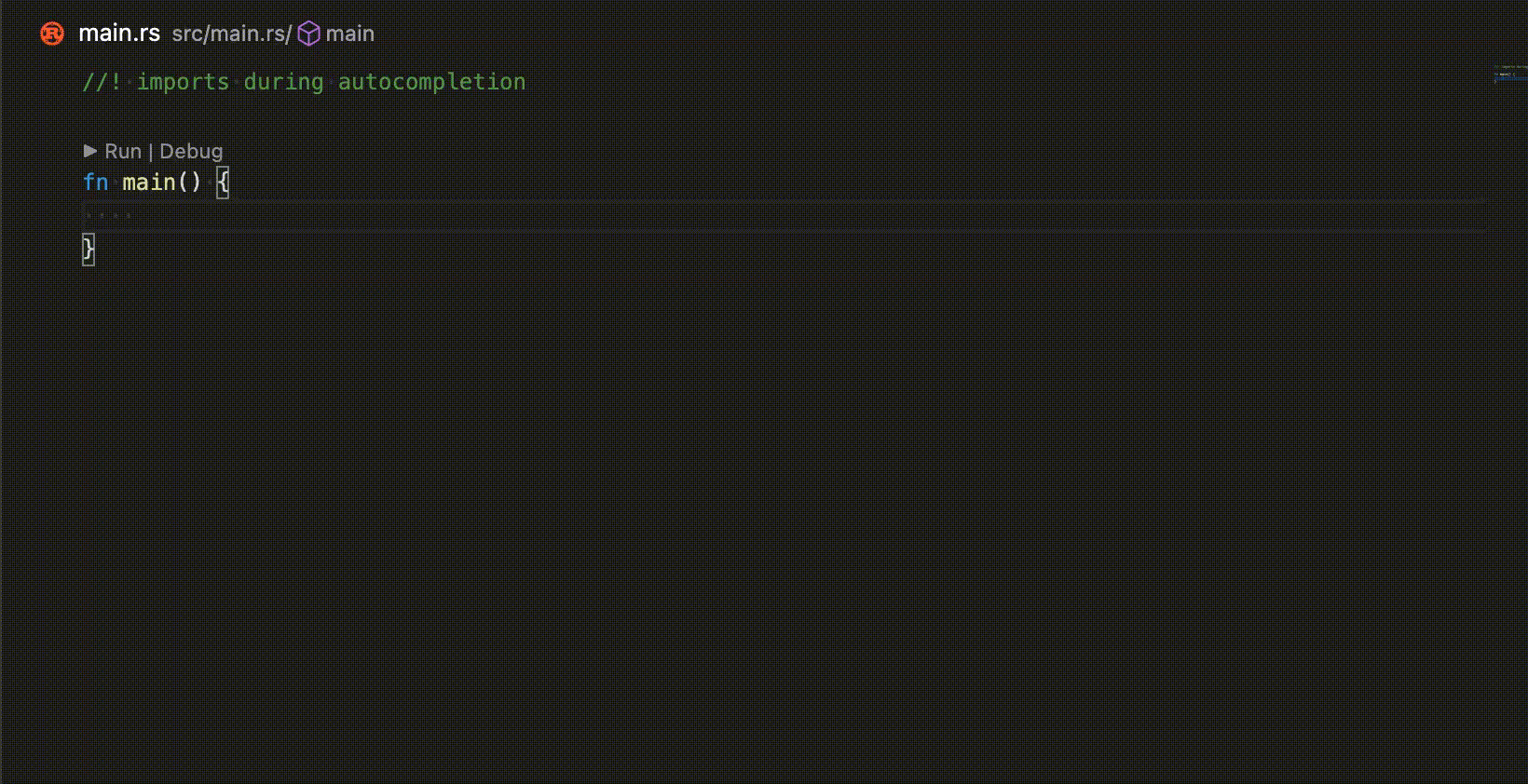
Closes https://github.com/rust-analyzer/rust-analyzer/issues/1062 but does not handle the completion order, since it's a separate task for https://github.com/rust-analyzer/rust-analyzer/issues/4922 , https://github.com/rust-analyzer/rust-analyzer/issues/4922 and maybe something else.
2 quirks in the current implementation:
* traits are not auto imported during method completion
If I understand the current situation right, we cannot search for traits by a **part** of a method name, we need a full name with correct case to get a trait for it.
* VSCode (?) autocompletion is not as rigid as in Intellij Rust as you can notice on the animation.
Intellij is able to refresh the completions on every new symbol added, yet VS Code does not query the completions on every symbol for me.
With a few debug prints placed in RA, I've observed the following behaviour: after the first set of completion suggestions is received, next symbol input does not trigger a server request, if the completions contain this symbol.
When more symbols added, the existing completion suggestions are filtered out until none are left and only then, on the next symbol it queries for completions.
It seems like the only alternative to get an updated set of results is to manually retrigger it with Esc and Ctrl + Space.
Despite the eerie latter bullet, the completion seems to work pretty fine and fast nontheless, but if you have any ideas on how to make it more smooth, I'll gladly try it out.
Co-authored-by: Kirill Bulatov <mail4score@gmail.com>
6251: Semantic Highlight: Add Callable modifier for variables r=matklad a=GrayJack
This PR added the `HighlightModifier::Callable` variant and assigned it to variables and parameters that are fn pointers, closures and implements FnOnce trait.
This allows to colorize these variables/parameters when used in call expression.
6310: Rewrite algo::diff to support insertion and deletion r=matklad a=Veykril
This in turn also makes `algo::diff` generate finer diffs(maybe even minimal diffs?) as insertions and deletions aren't always represented as as replacements of parent nodes now.
Required for #6287 to go on.
Co-authored-by: GrayJack <gr41.j4ck@gmail.com>
Co-authored-by: Lukas Wirth <lukastw97@gmail.com>
Declaration names sounds like a name of declaration -- something you
can use for analysis. It empathically isn't, and is just a label
displayed in various UI. It's important not to confuse the two, least
we accidentally mix semantics with UI (I believe, there's already a
case of this in the FamousDefs at least).
6130: Items case quick fix (snake_case / UPPER_SNAKE_CASE / CamelCase) r=matklad a=popzxc
Resolves#4598.
After a third try, it finally works. Boy, it appeared tougher than it seemed.
Initially I thought like "Ha, `rustc` already tells us where idents are named incorrectly. It shouldn't be that hard, should it?".
Well, the problems with the information provided by `rustc` appeared shortly:
- `rustc` warnings are `flycheck` warnings, which are slightly aside from our diagnostics with fixes.
When we map flycheck diagnostic to LSP, we can convert it into a fix, but only if it's marked as `Applicability::MachineApplicable`.
Name case fix is marked `Applicability::MaybeIncorrect`, and for a reason: it only suggest to rename symbol under cursor, without tracking any references.
- Warning spawned by `rustc` are identified by string labels rather than enum. It means that if one day the diagnostic will be renamed in `rustc`, `rust-analyzer` code will still compile, but won't find the required diagnostic by name anymore. If by chance this will happen when some unlucky guy will decide to create their first pull request, they'll be confused by suddenly failing tests (likely) not related to their changes.
- Even if we'll try to build fixes atop of `rustc` warnings, we'll have to do it in the `rust_analyzer::diagnostics::to_proto` module, which is far less
convenient for that matter than `ide` crate.
That's why I decided that it's worth a separate `rust-analyzer` diagnostic, which will implement `DiagnosticWithFix` trait.
After that, I discovered that currently `hir_ty::diagnostics` only check `DefWithBody` types, like function bodies. I had to add support for diagnostics
which look at any `ModuleDef`.
And of course, since I'd added a lot of new functionality, it required extensive testing.
That explains why the diff is so big for a (looking) relatively small feature.
I hope that this PR doesn't only add a small feature, but also creates a base for building another features.
## Example:
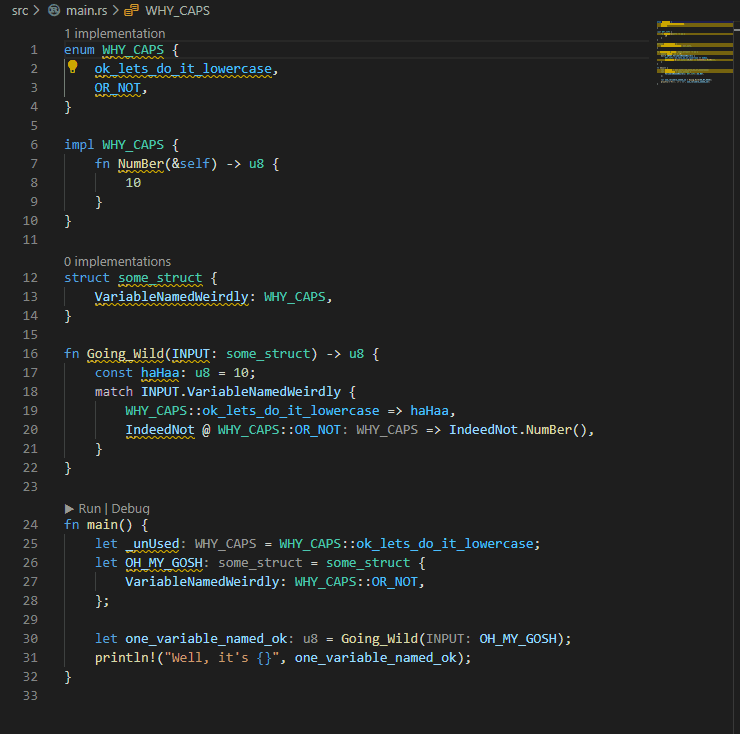
P.S. My eyes were bleeding when I had to write the code for the example...
6135: when generating new function, focus on return type instead of body r=matklad a=bnjjj
I made a little change when we use the assist to generate a new function, instead of focusing on the function body, it will focus on return type
Co-authored-by: Igor Aleksanov <popzxc@yandex.ru>
Co-authored-by: Benjamin Coenen <5719034+bnjjj@users.noreply.github.com>
5917: Add a command to open docs for the symbol under the cursor r=matklad a=zacps
#### Todo
- [ ] Decide if there should be a default keybind or context menu entry
- [x] Figure out how to get the documentation path for methods and other non-top-level defs
- [x] Design the protocol extension. In future we'll probably want parameters for local/remote documentation URLs, so that should maybe be done in this PR?
- [x] Code organisation
- [x] Tests
Co-authored-by: Zac Pullar-Strecker <zacmps@gmail.com>
Currently a method only has defaultness if it is a provided trait
method, but this will change when specialisation is available and may
need to become a concept known to hir.
I opted to go for a 'fewest changes' approach given specialisation is
still under development.
6124: Better normalized crate name usage r=jonas-schievink a=SomeoneToIgnore
Closes https://github.com/rust-analyzer/rust-analyzer/issues/5343
Closes https://github.com/rust-analyzer/rust-analyzer/issues/5932
Uses normalized name for code snippets (to be able to test the fix), hover messages and documentation rewrite links (are there any tests for those?).
Also renamed the field to better resemble the semantics.
Co-authored-by: Kirill Bulatov <mail4score@gmail.com>
5846: Add references to fn args during completion r=matklad a=adamrk
When completing a function call, if there is an argument taken as a ref or mut ref which matches the name and type of a variable in scope, we will insert a `&` or `&mut` when filling in the function arguments. This addresses https://github.com/rust-analyzer/rust-analyzer/issues/5449.
E.g.
```rust
fn foo(x: &i32) {}
fn main() {
let x = 5;
foo # completing foo here generates `foo(&x)` now instead of `foo(x)`
}
```
Co-authored-by: adamrk <ark.email@gmail.com>
5971: Implement async blocks r=flodiebold a=oxalica
Fix#4018
@flodiebold already gave a generic guide in the issue. Here's some concern about implementation detail:
- Chalk doesn't support generator type yet.
- Adding generator type as a brand new type (ctor) can be complex and need to *re-introduced* builtin impls. (Like how we implement closures before native closure support of chalk, which is already removed in #5401 )
- The output type of async block should be known after type inference of the whole body.
- We cannot directly get the type from source like return-positon-impl-trait. But we still need to provide trait bounds when chalk asking for `opaque_ty_data`.
- During the inference, the output type of async block can be temporary unknown and participate the later inference.
`let a = async { None }; let _: i32 = a.await.unwrap();`
So in this PR, the type of async blocks is inferred as an opaque type parameterized by the `Future::Output` type it should be, like what we do with closure type.
And it really works now.
Well, I still have some questions:
- The bounds `AsyncBlockImplType<T>: Future<Output = T>` is currently generated in `opaque_ty_data`. I'm not sure if we should put this code here.
- Type of async block is now rendered as `impl Future<Output = OutputType>`. Do we need to special display to hint that it's a async block? Note that closure type has its special format, instead of `impl Fn(..) -> ..` or function type.
Co-authored-by: oxalica <oxalicc@pm.me>
`hir` should know nothing about URLs, markdown and html. It should
only be able to:
* resolve stringy path from documentation
* generate canonical stringy path for a def
In contrast, link rewriting should not care about semantics of paths
and names resolution, and should be concern only with text mangling
bits.